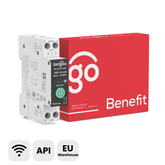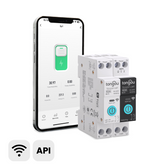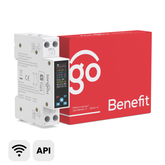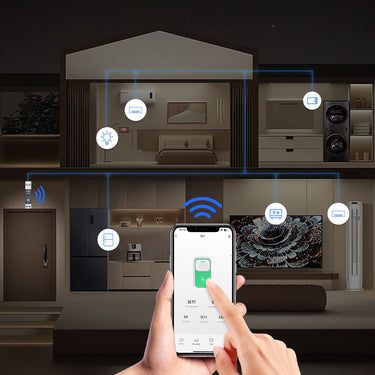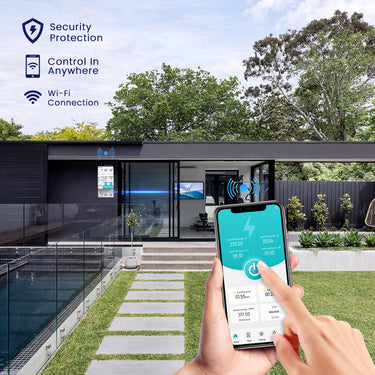What is a Smart Meter? How should I choose?

In the evolving landscape of energy management and conservation, smart meters stand out as revolutionary tools. These devices not only measure your electrical usage but also provide real-time data and enhanced control over your energy consumption.
2024, in today's modernization, intelligence is no longer a slogan, which is closely related to the life of each of us. High speed development of technology makes our life more and more convenient, are you still using the traditional meter, let's go through this article to understand the latest smart meter and make an upgrade for your home!
Understanding Smart Meters
A smart meter is a digital device that records energy consumption at intervals of one hour or less and transmits the information to the cloud in real time. Smart meters can send and receive data using wireless communication technology. No matter where you are, you can receive accurate information.
Features of Smart Meters:
- Real-Time Consumption Data: Smart meters provide detailed and real-time visibility of energy consumption, unlike traditional meters that only offer total consumption.
- Remote Communication: They communicate data directly to the energy supplier, eliminating the need for manual meter readings.
- Enhanced Control: Users can access their consumption data through digital interfaces, allowing for better energy management.

Smart Meters vs. Traditional Meters
The primary difference between smart meters and traditional electric meters lies in technology and functionality. Traditional meters only measure total energy consumption and require someone to read the meter physically. In contrast, smart meters offer a detailed breakdown of when energy was used, support automatic and remote data collection, and facilitate real-time communication between the consumer and the energy provider.A smart meter is a digital device that records energy consumption at intervals of one hour or less and transmits the information to the cloud in real time. Smart meters can send and receive data using wireless communication technology. No matter where you are, you can receive accurate information.
Smart Meter: Cons and Pros
Smart meters come with several advantages that enhance consumer experience and energy efficiency:
- Improved Accuracy: Reduces the chances of errors in billing and ensures consumers are only charged for the energy they actually use.
- Energy Saving: By providing information on energy usage patterns, smart meters help consumers identify opportunities to save energy.
- Cost-Effective: Real-time data allows consumers to take advantage of variable tariff rates where costs differ at different times of the day.
- Environmental Impact: Helps reduce carbon footprint by supporting energy reduction and peak load management.
However, there are concerns and negatives associated with smart meters:
- Privacy Issues: The transmission of detailed consumer energy usage data has raised privacy concerns.
- Health Concerns: There are debates about potential health risks from the electromagnetic fields emitted by smart meters.
- Initial Costs: The upfront cost for installing a smart meter can be higher compared to traditional meters.
The Future of Smart Meters
The future of smart meters looks promising with continuous advancements in technology. Integration with home energy management systems and IoT (Internet of Things) devices is expected to enhance their capabilities further. The data collected by smart meters can also be used to better understand and manage energy demand, paving the way for more sustainable energy systems.
How to Use Smart Meters to Save Energy
Smart meters empower consumers to make informed decisions about their energy use. By monitoring consumption patterns, users can adjust their habits to use less power during peak hours, thereby reducing their bills and contributing to grid stability. Additionally, integration with smart home technologies can automate energy saving, further optimizing consumption.

How to Choose a Smart Meter
When deciding to purchase a smart meter, consider the following steps:
- Check Compatibility: Ensure the smart meter is compatible with your home energy system and meets regulatory requirements.
- Understand Specifications: Look at features like data transmission frequency, integration capabilities, and additional functionalities.
- Compare Costs: Evaluate the total cost, including installation and any ongoing service fees.
- Select a Supplier: Choose a reputable supplier with good customer support and reliable technology.
- Professional Installation: Have the meter installed by a certified professional to ensure it operates correctly.
Tongou Smart Meter TO-Q-SYS
Conclusion
Smart meters are transformative devices in our continuous quest for energy efficiency and sustainability. While they bring numerous benefits, it’s critical to address the associated concerns, particularly regarding privacy and health. Understanding what smart meters can do, their advantages, and the proper steps to purchase and install one, is crucial for anyone looking to make an informed investment in managing their energy consumption more smartly and efficiently.


